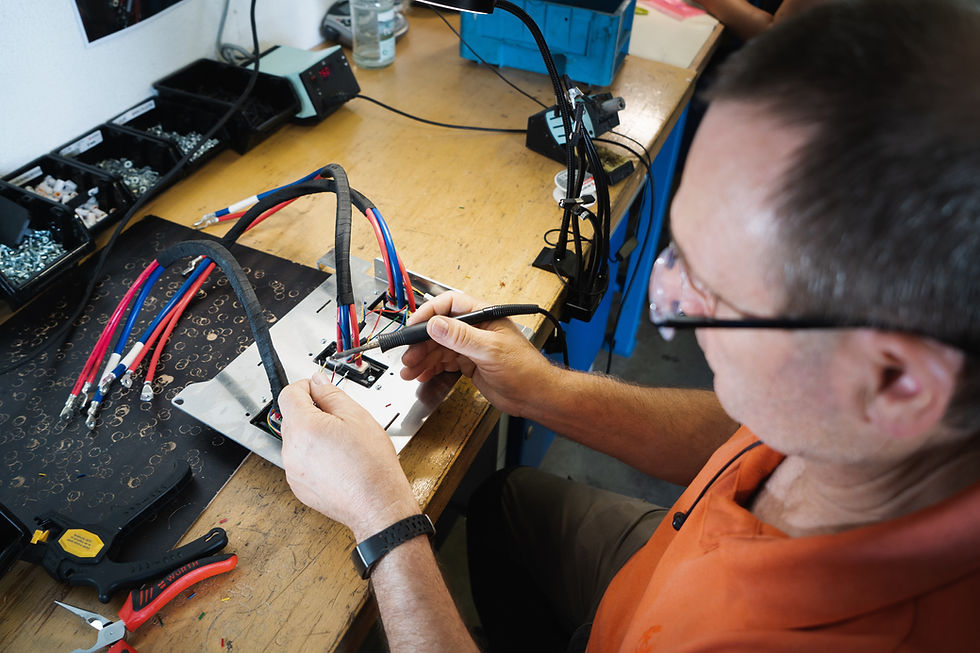Which Electrical Safety Class Is Right for Your Team?
- Brian Hall

- Jul 7, 2025
- 3 min read
We often receive questions from safety managers, operations leaders, and plant supervisors trying to determine which electrical safety class is right for themselves or their teams.
Indeed, not everyone in your facility faces the same electrical risks. Some employees might only use extension cords, while others regularly open energized panels. All of them need to be trained appropriately for the work they do and the hazards they may encounter. Managers can also benefit from some level of training, even if they are unlikely to come in contact with electrical hazards.
At Guidant Power, we offer several different courses designed for various roles and exposure levels.
To determine which class is best, ask yourself this question:
What is the level of exposure to electrical hazards?
Start with a walk-through or review of your operations. Then, categorize workers into groups based on their tasks and risks, from less exposure and lowest risk to the highest exposure and risk.
Four Classes, Real Examples
1. Electrical Safety for Non-Electrical Workers (1 hour) - Available Online in English or Spanish
Best for: Office staff, assembly workers, cleaning crew, and general personnel using extension cords, fans, or plug-in equipment.

Covers:
How to inspect extension cords
GFCI protection basics
How to spot an unsafe panel or exposed wire
What to do when you encounter a potential hazard
Why it matters: it’s required! NFPA 70E 2024 - 110.4(A)(2) states that even “unqualified persons shall be trained in, and be familiar with, any electrical safety-related practices necessary for their safety.”
The danger is real and often misunderstood, especially outside the electrical trade. According to ESFI, non-electrical occupations account for 74% of workplace electrical fatalities.
2. Qualified Electrical Worker Fundamentals (1 hour) - Available Online in English or Spanish
Best for: Mechanics, electricians, operators, managers, and anyone who interacts with disconnects or racking breakers, or conducts lockout/tagout.
Covers:
Arc flash awareness
How to read hazard labels
What “normal operation” means under NFPA 70E
When PPE is required and why
Why it matters: These employees aren’t doing electrical repairs, but they do interact with energized gear and need more than basic awareness.
3. Qualified Electrical Worker Training (<600V) - Available either as a Live Webinar, Online-On-Demand, or at Your Facility
Best for: Maintenance teams, in-house electricians, and anyone working on systems with 600V or less.
Covers:
Full NFPA 70E electrical safety protocol
Shock and arc flash risk
Use of insulated tools and PPE
Documentation and procedures
Why it matters: These are your high-exposure workers. They need comprehensive training to stay compliant and safe.
Best for: Electricians and maintenance staff working with systems over 600V — often in large facilities with substations.
Covers:
Hazards and procedures specific to medium/high voltage (e.g., 4.16kV, 13.8kV)
Proper detection equipment
Safe test practices
OSHA and NFPA high-voltage standards
Why it matters: OSHA classifies anything over 600V as high voltage. Specialized training is critical for working safely on this type of gear.
Basic Training for Managers (and Contractors)
It’s beneficial for supervisors and managers to understand their teams' electrical risks, even if they don’t work directly on equipment.
If you manage a team, we recommend attending either the Qualified Electrical Worker Fundamentals or the Non-Electrical Worker class at a minimum, so you can:
Know what constitutes unsafe work.
Understand PPE and signage.
Ask your team and contractors the right questions.
Contractors: You can require them to complete your in-house training or show proof of certification. It’s up to facility owners to make sure rules are followed by everyone working on their equipment – employees and everyone else.
Need Help Deciding? Get in Touch
No two facilities are the same, and neither are your training needs. If you're unsure which course is right for your team, you can ask our virtual electrical expert, Jouleene, or contact our staff directly.



